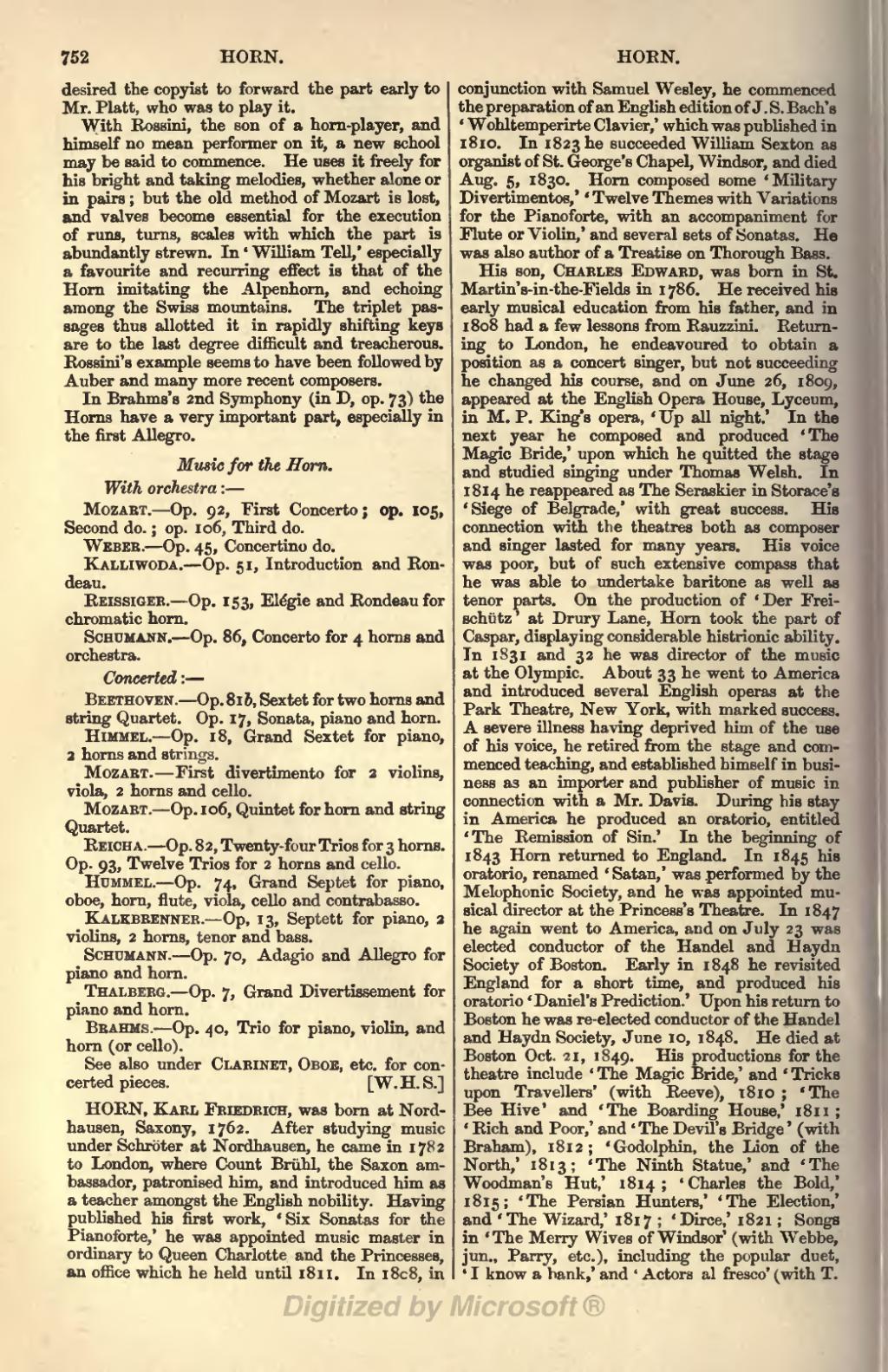desired the copyist to forward the part early to Mr. Platt, who was to play it.
With Rossini, the son of a horn-player, and himself no mean performer on it, a new school may be said to commence. He uses it freely for his bright and taking melodies, whether alone or in pairs; but the old method of Mozart is lost, and valves become essential for the execution of runs, turns, scales with which the part is abundantly strewn. In 'William Tell,' especially a favourite and recurring effect is that of the Horn imitating the Alpenhorn, and echoing among the Swiss mountains. The triplet passages thus allotted it in rapidly shifting keys are to the last degree difficult and treacherous. Rossini's example seems to have been followed by Auber and many more recent composers.
In Brahms's 2nd Symphony (in D, op. 73) the Horns have a very important part, especially in the first Allegro.
Music for the Horn.
With orchestra:—
Mozart.—Op. 92, First Concerto; op. 105, Second do.; op. 106, Third do.
Weber.—Op. 45, Concertino do.
Kalliwoda.—Op. 51, Introduction and Rondeau.
Ressiger.—Op. 153, Elégie and Rondeau for chromatic horn.
Schumann.—Op. 86, Concerto for 4 horns and orchestra.
Concerted:—
Beethoven.—Op. 81b, Sextet for two horns and string Quartet. Op. 17, Sonata, piano and horn.
Himmel.—Op. 18, Grand Sextet for piano, 2 horns and strings.
Mozart.—First divertimento for 2 violins, viola, 2 horns and cello.
Mozart.— Op. 106, Quintet for horn and string Quartet.
Reicha.—Op. 82, Twenty-four Trios for 3 horns. Op. 93, Twelve Trios for 2 horns and cello.
Hummel.—Op. 74, Grand Septet for piano, oboe, horn, flute, viola, cello and contrabasso.
Kalkbrenner.—Op, 13, Septett for piano, 2 violins, 2 horns, tenor and bass.
Schumann.—Op. 70, Adagio and Allegro for piano and horn.
Thalberg.—Op. 7, Grand Divertissement for piano and horn.
Brhams.—Op. 40, Trio for piano, violin, and horn (or cello).
See also under Clarinet, Oboe, etc. for concerted pieces.
HORN, Karl Friedrich, was born at Nordhausen, Saxony, 1762. After studying music under Schroter at Nordhausen, he came in 1782 to London, where Count Brühl, the Saxon ambassador, patronised him, and introduced him as a teacher amongst the English nobility. Having published his first work, 'Six Sonatas for the Pianoforte,' he was appointed music master in ordinary to Queen Charlotte and the Princesses, an office which he held until 1811. In 1808, in conjunction with Samuel Wesley, he commenced the preparation of an English edition of J. S. Bach's 'Wohltemperirte Clavier,' which was published in 1810. In 1823 he succeeded William Sexton as organist of St. George's Chapel, Windsor, and died Aug. 5, 1830. Horn composed some 'Military Divertimentos,' 'Twelve Themes with Variations for the Pianoforte, with an accompaniment for Flute or Violin,' and several sets of Sonatas. He was also author of a Treatise on Thorough Bass.
His son, Charles Edward, was born in St. Martin's-in-the-Fields in 1786. He received his early musical education from his father, and in 1808 had a few lessons from Rauzzini. Returning to London, he endeavoured to obtain a position as a concert singer, but not succeeding he changed his course, and on June 26, 1809, appeared at the English Opera House, Lyceum, in M. P. King's opera, 'Up all night.' In the next year he composed and produced 'The Magic Bride,' upon which he quitted the stage and studied singing under Thomas Welsh. In 1814 he reappeared as The Seraskier in Storace's 'Siege of Belgrade,' with great success. His connection with the theatres both as composer and singer lasted for many years. His voice was poor, but of such extensive compass that he was able to undertake baritone as well as tenor parts. On the production of 'Der Freischütz' at Drury Lane, Horn took the part of Caspar, displaying considerable histrionic ability. In 1831 and 32 he was director of the music at the Olympic. About 33 he went to America and introduced several English operas at the Park Theatre, New York, with marked success. A severe illness having deprived him of the use of his voice, he retired from the stage and commenced teaching, and established himself in business as an importer and publisher of music in connection with a Mr. Davis. During his stay in America he produced an oratorio, entitled 'The Remission of Sin.' In the beginning of 1843 Horn returned to England. In 1845 his oratorio, renamed 'Satan,' was performed by the Melophonic Society, and he was appointed musical director at the Princess's Theatre. In 1847 he again went to America, and on July 23 was elected conductor of the Handel and Haydn Society of Boston. Early in 1848 he revisited England for a short time, and produced his oratorio 'Daniel's Prediction.' Upon his return to Boston he was re-elected conductor of the Handel and Haydn Society, June 10, 1848. He died at Boston Oct. 21, 1849. His productions for the theatre include 'The Magic Bride,' and 'Tricks upon Travellers' (with Reeve), t8io; 'The Bee Hive' and 'The Boarding House,' 1811; 'Rich and Poor,' and 'The Devil's Bridge' (with Braham), 1812; 'Godolphin, the Lion of the North,' 1813; 'The Ninth Statue,' and 'The Woodman's Hut,' 1814; 'Charles the Bold,' 1815; 'The Persian Hunters,' 'The Election,' and 'The Wizard,' 1817; 'Dirce,' 1821; Songs in 'The Merry Wives of Windsor' (with Webbe, jun., Parry, etc.), including the popular duet, 'I know a bank,' and 'Actors al fresco' (with T.
